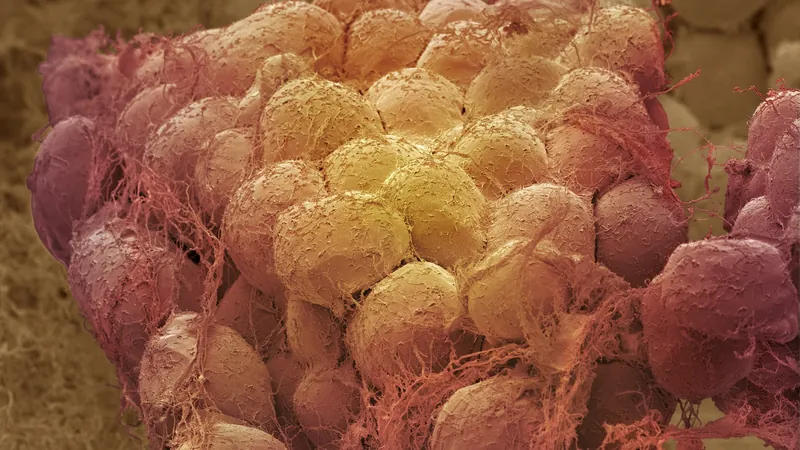
Unlocking the Secrets: How Weight Loss Can Rejuvenate Your Fat Cells!
2025-07-09
Author: Ming
A Revolutionary Discovery in Weight Loss Science
For years, scientists have delved into obesity's dark depths, but the effects of weight loss on our bodies have remained a mystery. That is, until now! A groundbreaking study published in *Nature* has lifted the veil, revealing that shedding pounds may not just be about losing weight—it's about transforming your fat at the cellular level!
Researchers discovered that weight loss can fundamentally alter fat tissue, possibly rejuvenating it and changing how it metabolizes. This pivotal research explains why some weight loss doesn't fully alleviate the health risks associated with obesity, as certain inflammatory cells persist even after losing weight.
What Happens to Your Fat Cells When You Lose Weight?
Led by obesity expert William Scott from Imperial College London, the study analyzed samples of abdominal fat from 25 individuals who underwent weight-loss surgery. At an average loss of 55 pounds, these participants showcased dramatic cellular transformations. Their fat samples were compared to those from 24 lean individuals, revealing startling insights.
Employing advanced RNA sequencing technology, researchers measured gene activity in over 170,000 cells, uncovering the intricate community of fat cells made up of adipocytes, immune cells, blood vessels, and neurons. Instead of a homogeneous mass, fat tissue emerges as a dynamic ecosystem that influences metabolism and overall health.
Reversing Aging and Fat Cell Interactions
The results stunned scientists: fat cells in individuals with obesity display signs of aging, promoting diseases linked to inflammation and scarring. However, with weight loss, these aged cells were cleared away, promoting healthier tissue. "The body clears damaged and harmful cells, effectively rejuvenating our tissues," Scott explained.
Additionally, the research illustrates a paradigm shift in how fat cells interact with fatty molecules in the bloodstream. When fat cells effectively recycle lipids, they minimize harmful fat accumulation in organs like the liver and pancreas, potentially reducing risks of insulin resistance and diabetes.
The Complex Reality of Weight Loss
Yet, not all cellular changes revert. Some immune cells, known to fuel obesity-related diseases, linger post-weight loss. This suggests that losing weight can't completely erase the underlying damage caused by obesity, highlighting the idea that maintaining a healthy weight from the start is far more beneficial.
Experts caution that while the study emphasizes these encouraging transformations, it doesn't encompass all complexities. The focus was solely on subcutaneous fat, and visceral fat—linked more closely to health risks—needs further exploration.
Looking Ahead: What Does This Mean for Obesity Treatments?
As researchers strive to decode the underlying mechanisms of weight changes, findings hint that noticeable metabolic health improvements can occur even with modest weight loss. Francesco Rubino, a metabolic surgery researcher, emphasizes that treatment success shouldn't purely hinge on dramatic weight loss.
So, in a world obsessed with numbers on the scale, could the secret to better health lie in how we treat our bodies, rather than how much weight we lose? This innovative research opens doors to future therapies tailored to harness the benefits of weight loss while minimizing the risks associated with obesity.
Stay Tuned: The Future of Weight Loss Science!
With ongoing studies promising to unravel the complexities of fat tissue dynamics, we may find new strategies emerging in the battle against obesity. Perhaps the journey to health isn't just about weight—it's about waging a war against the very cellular foundations of disease!




 Brasil (PT)
Brasil (PT)
 Canada (EN)
Canada (EN)
 Chile (ES)
Chile (ES)
 Česko (CS)
Česko (CS)
 대한민국 (KO)
대한민국 (KO)
 España (ES)
España (ES)
 France (FR)
France (FR)
 Hong Kong (EN)
Hong Kong (EN)
 Italia (IT)
Italia (IT)
 日本 (JA)
日本 (JA)
 Magyarország (HU)
Magyarország (HU)
 Norge (NO)
Norge (NO)
 Polska (PL)
Polska (PL)
 Schweiz (DE)
Schweiz (DE)
 Singapore (EN)
Singapore (EN)
 Sverige (SV)
Sverige (SV)
 Suomi (FI)
Suomi (FI)
 Türkiye (TR)
Türkiye (TR)
 الإمارات العربية المتحدة (AR)
الإمارات العربية المتحدة (AR)